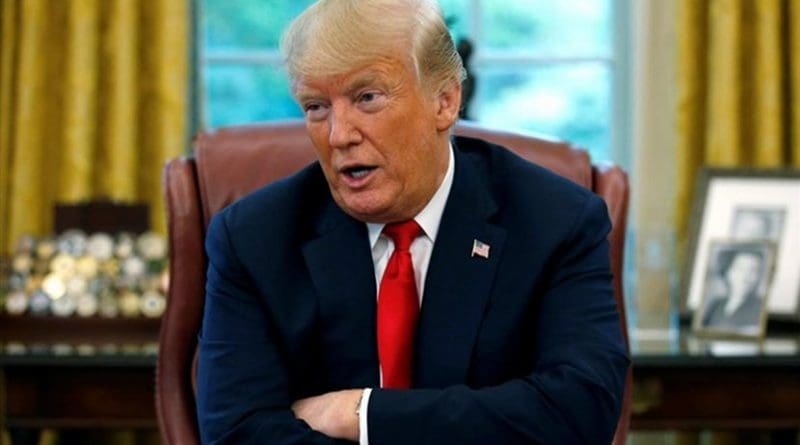Trump’s Israel-Palestine Deal To Pile Pressure On Jordan
By Ray Hanania
US President Donald Trump is due to unveil his much-hyped “deal of the century” plan for Israeli and Palestinian peace following the end of Ramadan next month.
It is being shepherded by Trump’s son-in-law Jared Kushner, who is his special envoy to the Middle East, and by lawyer Jason Greenblatt.
Although everyone is focused on how the peace plan seems set to destroy any hopes of a two-state solution — and while many Arab nations and the Palestinian leadership have already rejected it as biased and unworkable — the consequences of the proposal are expected to place Jordan in immediate political jeopardy.
The Hashemite Kingdom was created at about the same time as Mandatory Palestine following the conclusion of the First World War. Israeli extremists often argue that “Jordan is Palestine” and point to it as the “true” two-state solution. This perception was aggravated by the 1947-48 Jewish militia drive to control Palestine, during which Israel was created. Since then, Israel has done everything to rebuff all efforts to satisfy Palestinians’ demands for civil rights and statehood.
The wars of 1947-48 and 1967, as well as many other skirmishes, created a surge of Palestinian refugees who fled to neighboring Arab nations, with the largest groups ending up in Lebanon and Jordan.
Of the estimated 5.5 million Palestinians in the global diaspora, about half live in Jordan, most with Jordanian citizenship and many still with refugee status. Jordan was the only nation to offer Palestinian refugees citizenship as part of its political agenda in the 1950s. It aimed to define itself as the caretaker of the West Bank and East Jerusalem, both of which were lost to Israel in the Six-Day War of June 1967.
A peace plan that fails to create two states will have drastic negative consequences, not just for Israel but for the region, including Jordan.
Although no one knows the precise details of Trump’s deal, leaks have suggested it calls for several Arab nations to absorb the Palestinian refugees while allowing Israel to formally annex large areas of the occupied West Bank, including the Jewish-only settlements. The West Bank’s Palestinians, who are denied civil rights under Israel’s military occupation, are also excluded from residency in the settlements and would presumably be absorbed by neighboring Arab countries. But there is only one country that can absorb anything: Jordan.
Jordan has about 9.5 million citizens, with more than 2 million of them being Palestinian. Relations between the Palestinians, Palestinian factions and Jordan’s government have always been politically rocky.
Greenblatt has denied that the US peace plan will include giving Palestinians a part of the Sinai in Egypt, but he has been silent about what Jordan is expected to do.
Taking control of the destiny of Palestinians reopens a wound created in the late 1940s by the secret talks that the late Jordanian King Abdullah I held with Israel. He was ultimately assassinated by a Palestinian in 1951. Then, in 1994, King Hussein surrendered the concerns of the Palestinians and signed a peace agreement with Israel that failed to address Palestinian statehood.
The current ruler, King Abdullah II, has been a very Western-friendly leader, with strong ties to the US. But his nation has been racked by economic challenges.
To encourage Jordan to support the “deal of the century,” and to address Amman’s continuing economic challenges, the Trump administration last year agreed to increase US support for Jordan to $1.3 billion a year for five years.
That increase is suspected to be contingent on Jordan accepting the Trump peace deal and brushing aside Palestinian aspirations for a sovereign state in the West Bank and with Jerusalem as its capital, as was sought by Palestinians under the Oslo accords and the two-state solution.
The consequences of the impending Trump team deal will put the pressure and focus back on Jordan, regardless of the plan’s details. It also raises questions about Jordan’s sovereignty, especially if it absorbs the nearly 3 million Palestinians currently living under occupation in the West Bank and East Jerusalem.
It would be a huge risk and King Abdullah is already under pressure as concerns are starting to be raised. Making it more risky is the fact that no one really knows exactly how many Palestinians live in the Occupied Territories or in Jordan.
Without knowing it, the deal that Trump is planning to present through Kushner and Greenblatt could disrupt Jordan, which is already in a minor governmental crisis, and create renewed political turmoil.
Tragically, that appears to be a risk Israel and the US are willing to take.

